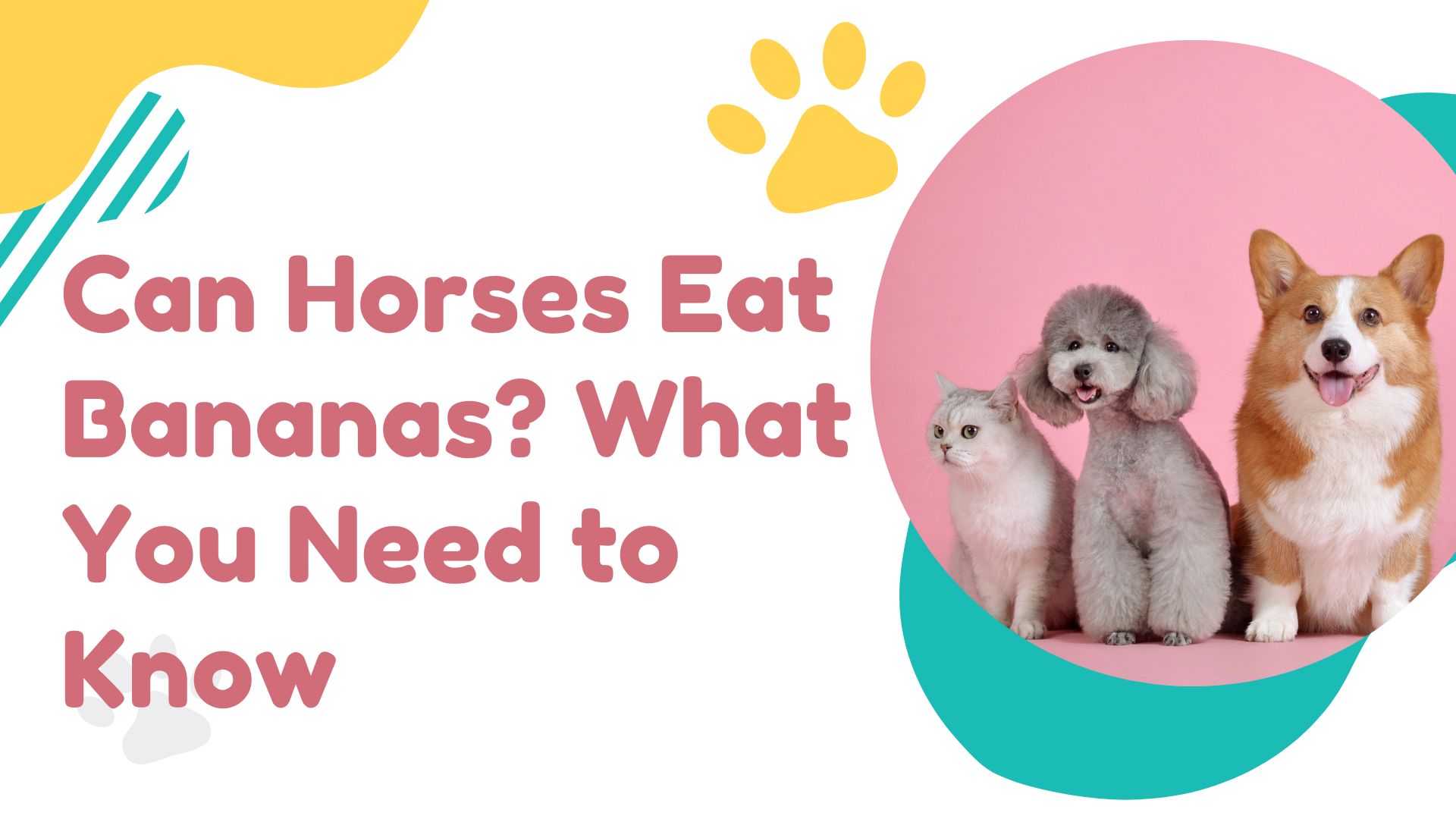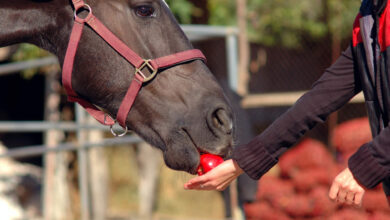
Horses munching on bright yellow bananas seem like an adorable sight. But should our equine friends be eating this sweet treat? Can horses eat bananas? Let’s figure it out…
As it turns out, horses can eat bananas – but only in strict moderation. Bananas can offer some nutritional value with their vitamin, mineral, and antioxidant content.
However, those high sugar levels mean bananas should only be an occasional snack.
Let’s explore the pros and cons of feeding bananas to horses to keep your animals happy and healthy.
Can Horses Eat Bananas?

Yes, horses can safely eat small amounts of bananas as a treat. Bananas contain helpful nutrients like potassium, vitamin C, copper and various antioxidants that horses need.
However, bananas are also very high in sugars. Too many bananas could lead to digestive upset, diarrhea or even laminitis according to horse treat guidelines from RSPCA.
So enjoy giving your horse a few bites of banana as a yummy snack. But don’t go banana-crazy! Limit bananas to occasional treats, not daily feed.
What’s Actually in Bananas Nutrition-Wise?
Bananas offer some key vitamins and minerals:
- Potassium – Important electrolyte for muscle function
- Vitamin C – Boosts immune health and helps absorb iron
- Copper – Needed for metabolism and bone development
- Antioxidants – Reduce inflammation and cell damage
However, bananas are low in other nutrients horses depend on, like calcium, phosphorus, and protein. And that high sugar content means moderation is key.
Read More: Can Horses Eat Celery?
The Good and Bad: Pros vs Cons
What are the main pros and cons when considering bananas for horses?
Pros:
- Bananas taste sweet and appealing. Horses gobble them up!
- Provide nutrients like potassium, copper, vitamin C
- Prebiotics may support gut health
- Antioxidants reduce inflammation
Cons:
- High in sugars – too much risks colic, diarrhea, and laminitis according to The Horse’s article on bananas
- Low in some key nutrients like calcium and protein
- Peels are slippery and pose a fall risk
- Some horses may have an allergic reaction
To play it safe, bananas should be limited to occasional treats in very small amounts. But as part of a balanced diet, bananas can be a nutritious snack horses relish.
A Healthy Banana Horse Treat Recipe
Since bananas should only be an occasional treat, you can try this recipe for banana oat horse cookies from Blue Cross for a safer alternative. Combining bananas with oats gives horses a tasty banana-themed treat that’s lower in sugar and higher in fiber.
What a great way to let horses enjoy that banana appeal without going overboard on their intake! Proper nutrition is key for horse health.
So be sure to feed bananas sparingly as part of a balanced diet. Check with your vet or equine nutritionist for any diet concerns. With smart moderation, bananas can be a fun and nutritious treat.
Feeding Bananas to Horses: How Much Is Safe and Health Risks
In small doses, bananas can be a tasty treat for horses. But how much banana can horses eat safely? And what health risks arise from overdoing it?
While the occasional banana chunk is fine, too many can spell trouble. Bananas are high in sugar and calories, so excessive portions pose some significant health hazards.
Let’s explore safe banana amounts for horses, plus the adverse effects that may appear if you go bananas with this sweet snack.
How Much Banana Can I Actually Feed My Horse?
When it comes to banana portion sizes for horses, moderation is crucial. Here are some handy banana-feeding guidelines:
- No more than 1-2 small slices 1-2 times per week
- Approximately 1 cup chopped banana max per day
- Very small amounts for miniature horses
- Gradually introduce bananas to check for allergies or sensitivity
As this article from Blue Cross details, one or two slices twice a week is sufficient for most horses. Listen to your horse’s signals and adjust as needed.
The Dangers of Too Many Bananas
Why so strict on banana quantities? Too many bananas present some real health hazards:
- Digestive upset – diarrhea, colic, gas pain
- Laminitis – inflammation of hooves from excess sugars
- Weight gain – bananas have lots of calories and sugar
- Nutritional imbalances – bananas displace healthier feed
- Allergic reactions – itching, hives, diarrhea
Bananas fed frequently or in large amounts are a risky recipe for disaster. Stick to recommended guidelines to keep your horse happy and healthy.
Recognizing Banana-Related Problems
If your horse does experience issues from too many bananas, here are some symptoms to watch for:
- Diarrhea – loose, watery manure
- Increased gas or signs of colic – turning to look at the belly, not eating, lying down excessively
- Laminitis – sore hooves, reluctance to move, visible laminitic rings
- Excessive thirst and urination
- Noticeable weight gain, especially around the neck
- Lethargy or behavior changes
- Skin irritation like itching, hives, or rubs
Catching problems early allows quick intervention. Consult your vet if any symptoms concern you.
Can Horses Eat Those Banana Peels?
What about banana peels? Yes, horses can eat them. But those peels pose some safety issues:
- Peels left on the ground become slippery and can cause horses to fall
- Some horses dislike the bitter taste of peels
- Peels are high in fiber but tough to digest
- Small amount of peel is ok – but best to just discard the peels
For safety, it’s smart to remove and toss those peels rather than leaving them for horses to eat.
Providing Safe, Limited Banana Treats
While excessive bananas are clearly risky, the occasional slice provides a fun, healthy treat horses enjoy.
Just stick within recommended guidelines. And consider mixing with other feeds rather than offering bananas alone.
With smart limits and monitoring, bananas can be part of a nutritious equine diet. But moderation is key to avoiding potential problems from overfeeding this sweet snack.
Feeding Bananas to Horses: Tips for Safe Treats and Healthy Alternatives
You want to safely indulge your horse’s sweet tooth with the occasional banana treat. But how do you introduce bananas while avoiding problems? What healthy alternatives can you try instead?
When used wisely, bananas make a fine periodic snack horses relish. Follow these tips for safe banana feeding, along with other nutritious options.
Smart Strategies for Feeding Banana Treats
Here are some tips for safely adding bananas into your horse’s diet:
- Mash bananas or cut them into small pieces to reduce choke risk
- Limit to 1-2 small slices 1-2 times weekly
- Mix banana pieces into other feeds rather than feeding them alone
- Monitor manure consistency and health after feeding
- Gradually introduce bananas to check for potential allergy or sensitivity
- Avoid right before intense exercise to prevent cramping
By using proper precautions, you can allow horses an occasional banana without safety risks.
More Fruits and Veggies Horses Can Enjoy
While bananas make a fine periodic treat, here are some other fruits and veggies to add variety:
- Apples – 1-2 per day, sliced
- Carrots – 1-2 medium per day, chopped
- Pears – 1-2 per week, sliced
- Melons like cantaloupe, honeydew – 1 cup cubes weekly
- Squash – small chunks of raw zucchini, pumpkin, butternut 1-2 times per week
- Berries like strawberries, blueberries, raspberries – 1⁄4 to 1⁄2 cup portions weekly
- Leafy greens like parsley, mint, kale, and spinach – half-cup serving sizes a few times a week
Rotating different produce keeps your horse’s diet exciting and nutritionally balanced. Monitor portions and reactions to any new foods.
Other Healthy Treat Alternatives
If you want to limit sugary banana treats, some other options to try include:
- Low-sugar horse cookies and treats – read labels to compare the sugar content
- Unsweetened oats, barley, or bran mashes
- Plain shredded wheat or rice cereal
- A few plain crackers or rice cakes
- Small pieces of bread
- Saltine crackers
- Hay cubes or compressed hay pellets
Providing treats designed for horses gives you peace of mind on safety and nutrition.
Know When to Avoid Bananas
While bananas are fine for most horses, avoid them in certain situations:
- If your horse has an allergy, sensitivity, or prior reaction
- If your horse is prone to laminitis
- For overweight horses who require weight loss
- For horses with gastric ulcers
- If your horse already gets adequate nutrition from its regular diet
- If you notice any digestive upset after eating bananas
Talk to your vet if you have any concerns about feeding bananas or other fruits.
Moderation Is Key with Bananas
When used sparingly as part of a balanced diet, bananas can be a safe, nutritious treat horses love. But with their high sugar content, moderation is crucial.
Follow suggested guidelines on portion sizes, introduce gradually, and watch your horse’s health closely. Avoid overfeeding this sweet snack.
With smart limits, bananas can be a delicious periodic reward horses enjoy. Just be sure not to go too bananas! Proper nutrition is vital for your horse’s health and happiness.
Frequently Asked Questions
Here are some common FAQs about feeding bananas to horses:
Can horses eat banana peels?
Yes, but it’s best to remove peels to prevent risks.
Can I feed horses bananas daily?
No, bananas should only be the occasional treat, not a daily food.
Are bananas good for horses?
In moderation, bananas can offer some nutritional benefits. But too many bananas can cause problems.
Are bananas high in sugar for horses?
Yes, bananas are high in sugar content. Limit portions to avoid issues.



